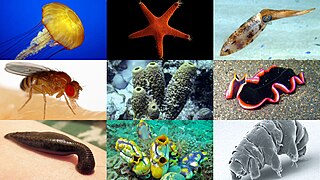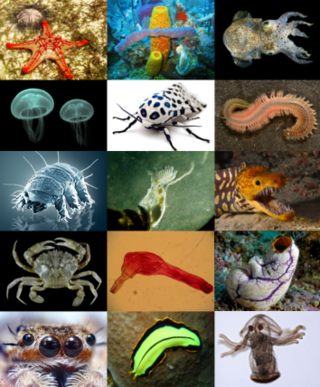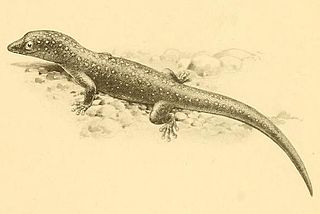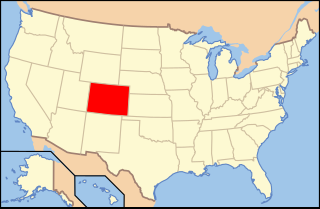
Amber is fossilized tree resin. Examples of it have been appreciated for its color and natural beauty since the Neolithic times, and worked as a gemstone since antiquity. Amber is used in jewelry and as a healing agent in folk medicine.

Invertebrates is an umbrella term describing animals that neither develop nor retain a vertebral column, which evolved from the notochord. It is a paraphyletic grouping including all animals excluding the chordate subphylum Vertebrata, i.e. vertebrates. Well-known phyla of invertebrates include arthropods, mollusks, annelids, echinoderms, flatworms, cnidarians, and sponges.

In polymer chemistry and materials science, a resin is a solid or highly viscous substance of plant or synthetic origin that is typically convertible into polymers. Resins are usually mixtures of organic compounds. This article focuses mainly on naturally occurring resins.

Horse-flies and deer flies are true flies in the family Tabanidae in the insect order Diptera. The adults are often large and agile in flight. Only female horseflies bite land vertebrates, including humans, to obtain blood. They prefer to fly in sunlight, avoiding dark and shady areas, and are inactive at night. They are found all over the world except for some islands and the polar regions. Both horse-flies and botflies (Oestridae) are sometimes referred to as gadflies.

The cephalothorax, also called prosoma in some groups, is a tagma of various arthropods, comprising the head and the thorax fused together, as distinct from the abdomen behind. The word cephalothorax is derived from the Greek words for head and thorax. This fusion of the head and thorax is seen in chelicerates and crustaceans; in other groups, such as the Hexapoda, the head remains free of the thorax. In horseshoe crabs and many crustaceans, a hard shell called the carapace covers the cephalothorax.

Mecoptera is an order of insects in the superorder Holometabola with about six hundred species in nine families worldwide. Mecopterans are sometimes called scorpionflies after their largest family, Panorpidae, in which the males have enlarged genitals raised over the body that look similar to the stingers of scorpions, and long beaklike rostra. The Bittacidae, or hangingflies, are another prominent family and are known for their elaborate mating rituals, in which females choose mates based on the quality of gift prey offered to them by the males. A smaller group is the snow scorpionflies, family Boreidae, adults of which are sometimes seen walking on snowfields. In contrast, the majority of species in the order inhabit moist environments in tropical locations.

The Archaeognatha are an order of apterygotes, known by various common names such as jumping bristletails. Among extant insect taxa they are some of the most evolutionarily primitive; they appeared in the Middle Devonian period at about the same time as the arachnids. Specimens that closely resemble extant species have been found as both body and trace fossils in strata from the remainder of the Paleozoic Era and more recent periods. For historical reasons an alternative name for the order is Microcoryphia.

Yponomeutoidea is a superfamily of ermine moths and relatives. There are about 1,800 species of Yponomeutoids worldwide, most of them known to come from temperate regions. This superfamily is one of the earliest groups to evolve external feeding and to colonize herbs in addition to shrubs and trees.

Hadrocodium wui is an extinct mammaliaform that lived during the Sinemurian stage of the Early Jurassic approximately 195 million years ago in the Lufeng Formation in what is now the Yunnan province in south-western China (25.2°N 102.1°E, paleocoordinates 34.3°N 104.9°E). It is considered as the closest relative of the class Mammalia.
Coelurus is a genus of coelurosaurian dinosaur from the Late Jurassic period. The name means "hollow tail", referring to its hollow tail vertebrae. Although its name is linked to one of the main divisions of theropods (Coelurosauria), it has historically been poorly understood, and sometimes confused with its better-known contemporary Ornitholestes. Like many dinosaurs studied in the early years of paleontology, it has had a confusing taxonomic history, with several species being named and later transferred to other genera or abandoned. Only one species is currently recognized as valid: the type species, C. fragilis, described by Othniel Charles Marsh in 1879. It is known from one partial skeleton found in the Morrison Formation of Wyoming, United States. It was a small bipedal carnivore with elongate legs.
Frank Morton Carpenter was an American entomologist and paleontologist. He received his PhD from Harvard University, and was curator of fossil insects at the Harvard Museum of Comparative Zoology for 60 years. He studied the Permian fossil insects of Elmo, Kansas, and compared the North American fossil insect fauna with Paleozoic taxa known from elsewhere in the world. A careful and methodical worker, he used venation and mouthparts to determine the relationships of fossil taxa, and was author of the Treatise volume on Insects. He reduced the number of extinct insect orders then described from about fifty to nine.

Saurophaganax is a genus of large allosauroid dinosaur from the Morrison Formation of Late Jurassic Oklahoma, United States. Some paleontologists consider it to be a junior synonym and species of Allosaurus. Saurophaganax represents a very large Morrison allosauroid characterized by horizontal laminae at the bases of the dorsal neural spines above the transverse processes, and "meat-chopper" chevrons. It was the largest terrestrial carnivore of North America during the Late Jurassic, reaching 10.5 metres (34 ft) in length and 2.7–3.8 metric tons in body mass.

Animals are multicellular, eukaryotic organisms in the biological kingdom Animalia. With few exceptions, animals consume organic material, breathe oxygen, have myocytes and are able to move, can reproduce sexually, and grow from a hollow sphere of cells, the blastula, during embryonic development. Animals form a clade, meaning that they arose from a single common ancestor.

A penis is a male sex organ that is used to inseminate female or hermaphrodite animals during copulation. Such organs occur in both vertebrates and invertebrates, but not in all male animals.

An organism's sex is female if it produces the ovum, the type of gamete that fuses with the male gamete during sexual reproduction.
Paleontology or palaeontology is the study of prehistoric life forms on Earth through the examination of plant and animal fossils. This includes the study of body fossils, tracks (ichnites), burrows, cast-off parts, fossilised feces (coprolites), palynomorphs and chemical residues. Because humans have encountered fossils for millennia, paleontology has a long history both before and after becoming formalized as a science. This article records significant discoveries and events related to paleontology that occurred or were published in the year 1878.

Sphaerodactylus argus, also known commonly as the ocellated gecko, the ocellated sphaero, and the stippled sphaero, is a species of lizard in the family Sphaerodactylidae native to the Caribbean and surrounding regions. There are two recognized subspecies.

Fruitadens is a genus of heterodontosaurid dinosaur. The name means "Fruita teeth", in reference to Fruita, Colorado (USA), where its fossils were first found. It is known from partial skulls and skeletons from at least four individuals of differing biological ages, found in Tithonian rocks of the Morrison Formation in Colorado. Fruitadens is one of the smallest known ornithischian dinosaur, with young adults estimated at 65 to 75 cm in length and 0.5 to 0.75 kg in weight. It is interpreted as an omnivore and represents one of the latest-surviving heterodontosaurids.

Paleontology in Colorado refers to paleontological research occurring within or conducted by people from the U.S. state of Colorado. The geologic column of Colorado spans about one third of Earth's history. Fossils can be found almost everywhere in the state but are not evenly distributed among all the ages of the state's rocks. During the early Paleozoic, Colorado was covered by a warm shallow sea that would come to be home to creatures like brachiopods, conodonts, ostracoderms, sharks and trilobites. This sea withdrew from the state between the Silurian and early Devonian leaving a gap in the local rock record. It returned during the Carboniferous. Areas of the state not submerged were richly vegetated and inhabited by amphibians that left behind footprints that would later fossilize. During the Permian, the sea withdrew and alluvial fans and sand dunes spread across the state. Many trace fossils are known from these deposits.

The subphylum Hexapoda or hexapods comprises the largest clade of arthropods and includes most of the extant arthropod species. It includes the crown group class Insecta, as well as the much smaller class Entognatha, which includes three groups of wingless arthropods that were once considered insects: Collembola (springtails), Protura (coneheads) and Diplura. The insects and springtails are very abundant and are some of the most important pollinators, basal consumers, scavengers/detritivores and micropredators in terrestrial environments.
















